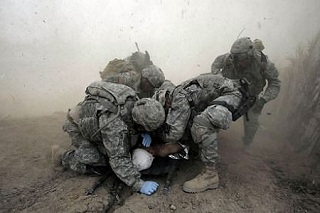A Decade of US War Costs
On June 29, Reuters writer Daniel Trotta headlined, "Cost of war at least $3.7 trillion and counting," explaining:
In June, when Obama claimed America's post-9/11 (Iraq/AfPak) wars cost $1 trillion, he did what he does best - lied about how much, in fact, was spent and projected, five or more times his figure.
According to a June Brown University Watson Institute for International Studies (WIIS) "Cost of War" report, up to $5,444 trillion was spent and projected with all related expenses and obligations included. More on that below.
In March, the Congressional Research Service (CRS) made its own estimate in an Amy Belasco report titled, "The Cost of Iraq, Afghanistan, and Other Global War on Terror Operations Since 9/11," saying:
Post-9/11, America "initiated three military operations:"
>1) Operation Enduring Freedom (OEF) in:● Afghanistan (OEF-A), combined with an undeclared Pakistan one; as well as small Global Wars on Terror (GWOT) in
● the Philippines (OEF-P);
● Horn of Africa (OEF-HOA);
● Pankisi Gorge (near Russia, completed in 2004);
● Trans Sahara (OEF-TS, in 10 North and Sub-Saharan African countries);
● Caribbean/Central American (OEF-CCA) ones; and
● Kyrgyzstan (completed in 2004).(2) Operation Noble Eagle (ONE) for military operations related to homeland and base security, including mobilizing National Guard troops to protect military installations, airports, power plants, port facilities, and other vital infrastructure.
(3) Operation Iraqi Freedom (OIF), renamed Operation New Dawn in September 2010.
Through FY 2011, CRS lowballed a $1,283 trillion cost, including:
● $806 billion for Iraq;
● $444 billion for Afghanistan;
● $29 billion for enhanced security; and
● an unallocated $6 billion.
The full CRS report can be accessed through this link.
In 2008, Joseph Stiglitz and Linda Bilmes published "The Three Trillion Dollar War: The True Cost of the Iraq Conflict," available in book form from Amazon. Calling it a war of choice, they included current and estimated future costs, as well as intangible ones, including:
● reduced capability to respond to other national security threats;
● costly global anti-American sentiment;
● the price paid for falsely claiming America defends human rights, civil liberties, and democratic values; and
● eroding Washington's soft power to influence political, economic, environmental, judicial and other issues.
Stiglitz and Bilmes suggested that America is in long-term decline, a view shared by Chalmers Johnson, Immanuel Wallerstein, Gabriel Kolko and others. WIIS' entire study can be accessed through this link. Produced by a team of economists, anthropologists, political scientists, legal experts, and a physician, it discusses human, social, political, environmental, and economic costs.
This article covers the latter. It's disturbing enough to question how much longer this nightmare can be tolerated, killing millions, harming many more, laying waste to countries attacked, destroying a generation of young men, and heading America for bankruptcy, tyranny and ruin to satisfy out-of-control corrupted wealth and power interests.
When totaling the known costs of war, including veterans' medical and disability obligations, the amount way exceeds Stiglitz and Bilmes $3 trillion estimate.
Specific categories covered include:
● congressional war appropriations;
● supplemental add-ons;
● military related national debt interest;
● veterans' medical and disability costs; and
● war related international aid (State Department/USAID).
Total Direct Outlays: $2,331.1 - $2,657.3 trillion
● projected future obligations through 2050; and
● social costs to veterans and military families.
Total Outlays Through FY 2011 and projected medical and disability costs: $3,215.1 - $3,991.3 trillion
● requested FY2012 Pentagon war spending;
● requested FY 2012 State Department/USAID Afghanistan, Iraq and Pakistan spending;
● projected FY 2013 - 2015 Pentagon war spending with 45,000 troops withdrawn;
● projected FY 2016 - 2020 Pentagon war spending; and
● additional interest payments to 2020.
Grand Total: $4,668.2 - $5,444.4 trillion.
Additional costs include:
● medical care for injured veterans over age 65;
● expenses for veterans paid for by state and local governments;
● promised $5.3 billion in Afghanistan reconstruction aid; and
● other macroeconomic consequences of war, including infrastructure and jobs.
Post-9/11, in addition to Pentagon war spending, "$5,238.7 billion in constant dollars was appropriated for ostensibly non-war DOD expenses" - the "base'' DOD budget through FY 2011.
Military spending affects debt, interest rates, jobs, and investment. While defense related employment increases, more productive sectors lose out, resulting in a net overall macroeconomic loss. Also, while military infrastructure grows, public infrastructure and investment spending suffer, creating what some call an "infrastructure deficit," markedly increasing in the last decade to fuel America's war machine.
Post-9/11, WIIS said direct and indirect war costs "have been consistently minimized, misunderstood, or hidden from public view," including shocking human costs and enormous future obligations. Undiscussed, taxpayers don't know where their money goes, how much, for what, how long, or why.
Overall it's vital information people need to know to let them decide if it's worth it. It never is, despite duplicitous national security claims. Only imperial interests and war profiteers gain at the expense of people needs losing out for them.
A Final Comment
Besides known trillions for wars (not people and other homeland needs), Pentagon officials spent unaccountable trillions more. On September 10, 2001, former Defense Secretary Donald Rumsfeld admitted:
"According to some estimates, we cannot track $2.3 trillion in transactions."
Defense Finance and Accounting Service analyst Jim Minnery said:
"We know it's gone. But we don't know what they spent it on." He risked his job exposing Pentagon corruption. So much so, his boss asked, "Why do you care about this stuff?"
Shortly afterwards he was reassigned to let grand theft Pentagon press on, free from whistleblower oversight. Years later, Spinney said he believed the problem got worse, saying:
"The books are cooked routinely year after year."
Even retired Vice Admiral Jack Shanahan said,
"With good financial oversight, we could find $48 billion in loose change in that building, without having to hit the taxpayers."
In fact, a June 2001 Senate Governmental Affairs Committee study titled, "Government at the Brink" exposed pervasive unreliable financial oversight throughout Washington. Nonetheless, initial FY 2002 budget appropriations rewarded the very agencies at fault, practically accused of cooking the books.
Moreover, former HUD Assistant Secretary/Wall Street official/current Solari, Inc. head Catherine Austin Fitts once said:
"Total (DOD and HUD) undocumented accounting adjustments (for FYs 1998 - 2000) amount to a whopping $3.3 trillion. (In addition, the) Department of Defense has failed to produce independent audited financial statements since" required to do so in 1995. HUD's Inspector General (also) refused to certify (its) 1999 financial statements."
As a result, America's business isn't just war. It's grand theft Pentagon and throughout Washington to steal unknown trillions, staggering amounts going back years.
Post-9/11, it's greater than ever because bipartisan criminality OKs it, profiting also from campaign contribution kickbacks and hidden favors. Let the good times roll. Only taxpayers lose out.
___________________________________________________________________________________

Stephen Lendman: I was born in 1934 in Boston, MA. Raised in a modest middle class family, attended public schools, received a BA from Harvard University in 1956 and an MBA from the Wharton School at the University of PA in 1960 following 2 years of obligatory military service in the US Army. Spent the next 6 years as a marketing research analyst for several large US corporations before becoming part of a new small family business in 1967, remaining there until retiring at the end of 1999. Have since devoted my time and efforts to the progressive causes and organizations I support, all involved in working for a more humane and just world for all people everywhere, but especially for the most needy, disadvantaged and oppressed. My efforts since summer 2005 have included writing on a broad range of vital topics ranging from war and peace; social, economic and political equity for all; and justice for all the oppressed peoples of the world like the long-suffering people of Haiti and the Palestinians. Also co-hosting The Global Research News Hour, occasional public talks, and frequent appearances on radio and at times television.
Stephen Lendman is a Research Associate of the Centre for Research on Globalization. He lives in Chicago and can be reached at lendmanstephen@sbcglobal.net. Also visit his blog site sjlendman.blogspot.com and listen to The Lendman News Hour on RepublicBroadcasting.org Monday - Friday at 10AM US Central time for cutting-edge discussions with distinguished guests on world and national issues. All programs are archived for easy listening.
___________________________________________________________________________________
URL: http://www.a-w-i-p.com/index.php/2011/07/14/a-decade-of-us-war-costs

























